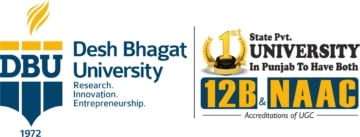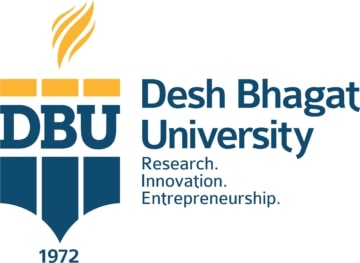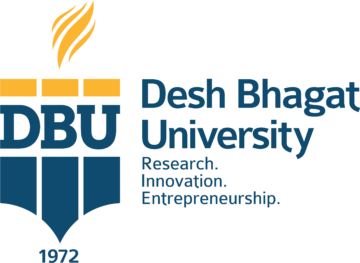Building Future: B.Tech Engineering course at Desh Bhagat University
June 1, 2023 2023-09-04 7:20Building Future: B.Tech Engineering course at Desh Bhagat University

Building Future: B.Tech Engineering course at Desh Bhagat University
B. Tech engineering at desh bhagat university industry has long been admired for its expertise and commitment to national economic development. India, which has a long history of generating highly qualified engineers, has become a worldwide engineering center, luring significant investments in technology and fostering innovation. B. tech Engineering has been a key driver of India’s growth, from constructing amazing infrastructural projects to dominating in software creation and research. However, there is constant discussion over the role of b.tech engineering in India as the labor market changes and technology develops. While some contend that the industry may be nearing saturation. others think there are still untapped potential in non-traditional engineering fields. In this blog, we dive into this stimulating conversation and look at the condition and prospects of B. Tech Engineering in india.
The Past Success of Engineering in India

India’s engineering sector has traditionally achieved incredible success, propelling the country to a significant position in technical advancement.
India has produced a pool of intelligent engineers that have significantly impacted . A number of industries placed a strong emphasis on science and engineering education.
The country’s engineering achievements range from the construction of beautiful infrastructure projects like Bandra- Worli Sea Link and the Delhi Metro to advancements in information technology and software development.
Furthermore, India’s technological competence has contributed greatly to the country’s economic development by attracting international capital and making India a favored outsourcing location for engineering services.
Changing Dynamics of the Job Market
The job market dynamics in India’s engineering industry are experiencing major change, necessitating a careful analysis of its future prospects. Traditional engineering positions are changing as a result of automation and technological improvements, raising worries about potential job loss. But this change also offers fresh chances. Interdisciplinary skills are in high demand, with engineering professionals expected to have a mix of technical knowledge and cross-functional competencies.
Additionally, skill-based employment is expanding, necessitating engineers’ adaptation to sectors like renewable energy, artificial intelligence, and the construction of sustainable infrastructure.
While the shifting dynamics provide difficulties, they also provide opportunities for new career pathways outside of engineering’s traditional purview, pushing professionals to investigate innovation, specialization, and ongoing learning for long-term success in the changing.
The Perception of Oversaturation
The perception of oversaturation in India’s engineering sector has been debated. Although there have been a lot more engineering graduates in recent years it is important to examine the relationship between this influx and the employment chances. According to statistics. India generates a lot of engineering graduates each year, raising worries about a lack of openings for suitable jobs. However, it is crucial to take into account geographical differences in engineering demand and employment opportunities. In comparison to rural or less industrialized places, metropolitan centers and technology-driven cities frequently provide a wider range of options. Additionally, some engineering specialties may have greater demand than others, resulting in varying levels of market saturation. Consequently, despite the appearance of oversaturation, a
more thorough examination of regional dynamics.
The Importance of Specialization and Innovation
In today’s competitive environment, specialization with in engineering specialties has become increasingly important. Engineers with specialized knowledge and skill in certain disciplines are increasingly in demand as industries change. Specialization enables engineers to obtain a competitive edge and establish themselves as in-demand experts by delving further into their chosen sector. In addition, as a result of industrial demands and technical developments, specialty engineering positions are forming. Engineers with specific understanding in industries like robotics, cybersecurity, and renewable energy are in high demand.
Additionally, successful engineering professions now depend heavily on innovation and entrepreneurship. In a market that is always shifting, engineers who can think creatively, solve problems, and offer novel solutions are highly regarded. Engineers may shape the future by embracing entrepreneurial attitudes and promoting an innovative culture.
Opportunities beyond Traditional Engineering
Beyond traditional engineering roles, there exists a plethora of alternative career paths for engineering graduates in India. The rise of interdisciplinary fields has opened up exciting opportunities, as technology intersects with domains such as healthcare, finance, and entertainment. Engineers with a knack for data analysis and machine learning can explore careers in data science or artificial intelligence. The renewable energy sector presents vast prospects for engineers passionate about sustainability and clean technologies. Additionally, emerging sectors like space exploration, biotechnology, and autonomous vehicles demand engineering skills and expertise. By adapting to these evolving industries and acquiring cross-functional knowledge, engineering graduates can embark on diverse and fulfilling career journeys, making valuable contributions in areas beyond the traditional engineering scope.
The Role of Skill Development and Continuous Learning
For engineers to succeed in the competitive employment market of today, on going skill development is important. Maintaining relevance and competitiveness in the face of extremely fast technology breakthroughs requires remaining current on emerging technologies and market trends. Engineers must actively seek out chances to advance their expertise and abilities and adopt a lifelong learning mentality. While online learning platforms provide quick access to upskilling materials, colleges and universities institutions play a key role in delivering specialized training and advanced degrees. Through a number of possibilities, including specialist training, certifications, workshops, and webinars, engineers may increase their expertise. Engineers can adapt to shifting needs, open up new career prospects, and improve technology in their specialized domains by investing in continual learning.
Conclusion
In conclusion, the scope of engineering in India is not limited but rather evolving. While there may be discussions about saturation and the changing dynamics of the job market there are still ample opportunities for engineers to thrive. Specialization within engineering fields and the demand for niche roles highlight the importance of continuous skill development and staying updated with new technologies. The rise of interdisciplinary fields and emerging sectors further expand the horizons for engineering professionals. It is crucial for engineers to embrace innovation and entrepreneurship, while also exploring alternative career paths beyond traditional engineering domains. By adopting a proactive approach to learning and seizing diverse opportunities, engineers can forge successful and fulfilling careers in India’s ever-changing engineering landscape.








